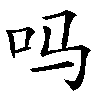吗 mǎ ?; question
Made up of [口 kǒu mouth radical 30, 马 mǎ horse radical 187]Alternative traditional form of character: 嗎
Made with 6 strokes.
The 'mouth' radical suggests it is to do with speech, the horse part gives the sound.
Related characters
Also uses 口 kǒu component: 吧 bā (supposition or suggestion) 唱 chàng (to sing) ; 超 chāo (to exceed) ; 吃 chī (to eat) ; 船 chuán (boat) ; 啡 fēi (coffee) ; 富 fù (rich) ; 福 fú (good fortune) ; 告 gào (to tell) ; 各 gè (each) ; 宫 gōng (palace) ; 狗 gǒu (dog) ; 古 gǔ (ancient) ; 咳 hāi (sound of sighing) ; 号 hào (name) ; 和 hé (together) ; 合 hé (to close) ; 喝 hē (drink) ; 亨 hēng (prosperous) ; 后 hòu (behind) ; 回 huí (to circle) ; 或 huò (maybe) ; 吉 jí (lucky) ; 叫 jiào (called) ; 京 jīng (capital) ; 咎 jiù (fault) ; 句 jù (sentence) ; 局 jú (office) ; 君 jūn (monarch) ; 咖 kā (coffee) ; 可 kě (can) ; 另 lìng (other) ; 命 mìng (life) ; 名 míng (name) ; 鸣 míng (to call (birds)) ; 呢 ne (and you?) ; 啤 pí (hops) ; 品 pǐn (article) ; 如 rú (as) ; 尚 shàng (still) ; 事 shì (matter) ; 史 shǐ (history) ; 虽 suī (although) ; 台 tái (typhoon) ; 唐 táng (Tang) ; 听 tīng (to listen) ; 同 tóng (same) ; 问 wèn (ask) ; 喜 xǐ (to be fond of) ; 兄 xiōng (elder brother) ; 咬 yǎo (to bite) ; 右 yòu (right) ; 语 yǔ (language) ; 员 yuán (person) ; 曰 yuē (to speak) ; 占 zhān (to observe) ; 只 zhī (one) ; 知 zhī (to know) ; 周 zhōu (circuit) ; 足 zú (foot)
Also uses 马 mǎ component: 妈 mā (mother) 驻 zhù (to halt)
Sounds same
马 mǎ (horse)Different tone
妈 mā (mother)Pronunciation
Sound file kindly provided by shtooka.net ➚ under a Creative Commons Attribution Share Alike License

Stroke order for character 吗, kindly provided under Wikimedia creative commons license ➚
Phrases
你 是 英 国 人 吗 nǐ shì yīng guó rén mǎ Are you English?你 好 吗 nǐ hǎo mǎ How are you?
还 要 青 菜 吗 hái yào qīng cài mǎ Are there any more vegetables?